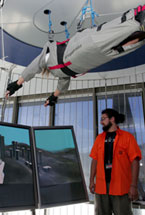| |
|
|
|
|
||
|
|
|||||||||||||||||||
InfotrainerSkills that will be in demand in the future—that means possessing the ability to deal with communications technologies and to utilize them productively, and being fully conversant in the possibilities and limitations of acquiring and processing information. These are capabilities that cannot be imparted by hardware and virtual channels alone. That’s why the Ars Electronica Center’s primary emphasis in facilitating the encounter with digital media art is on the oldest form of communication—a conversation involving two human beings. Highly competent infotrainers are stationed on all of our exhibition levels to provide clarification and support. Through interpersonal dialog, they assist visitors in interacting with the individual stations, convey a work’s underlying artistic concept and elaborate on its technical details. The background information and concrete illustrations they provide make a tour through the museum an entertaining and informative experience. The ongoing process of updating and expanding the Museum’s complex content constitutes a major challenge to the facility’s entire staff. Intensive contacts with the artists and extensive efforts by Artistic Director Gerfried Stocker to provide insights into their works and the concepts behind them are therefore a matter of course. The technology and the installations support the infotrainers’ efforts to communicate information, concepts and background related to each exhibit and to enable visitors to experience all it has to offer. The process of seeing to the needs of the Ars Electronica Center’s guests proceeds according to a concept developed expressly for the Museum of the Future and is one that stresses the importance of human beings and interpersonal communication. As bearers of relevant information, the infotrainers function as mediators between visitors and each individual installation and its message. The infotrainers and their knowledge are an indispensable part of the exhibition, and no less important than the content itself—one without the other would mean that essential information would of necessity be lost. Accordingly, the central objective of the Museum of the Future is to facilitate an interactive process of encountering the exhibitions’ contents and thereby to offer our visitors an experience that is both unique and of unsurpassed quality. After all, is there a better, more vivid way to present innovative and complex technological concepts—like “augmented reality,” for instance—than to enable visitors to experience it and experiment with it themselves? Another special aspect of the support services provided to visitors in the Ars Electronica Center is the particular attention paid to maintaining a staff of infotrainers that represents the entire spectrum of age groups and thus mirrors the age diversity of our visitors. From elementary school pupils to retirees, from kids to seniors—in short, young and old visit the Museum of the Future and respond to its installations with curiosity and enthusiasm. Thanks to the help provided by our infotrainers, visitors need to possess no prior knowledge in order to be assured of having a fun, interesting and informative time in the Museum of the Future. Our guiding principle: there are no inadmissible questions! Thoroughly trained and equipped with expert knowledge and background information, our infotrainers endeavor to completely satisfy our visitors’ individual information requirements. |
 |
||||||||||||||||
| © Ars Electronica Linz GmbH, info@aec.at | ||||||||||